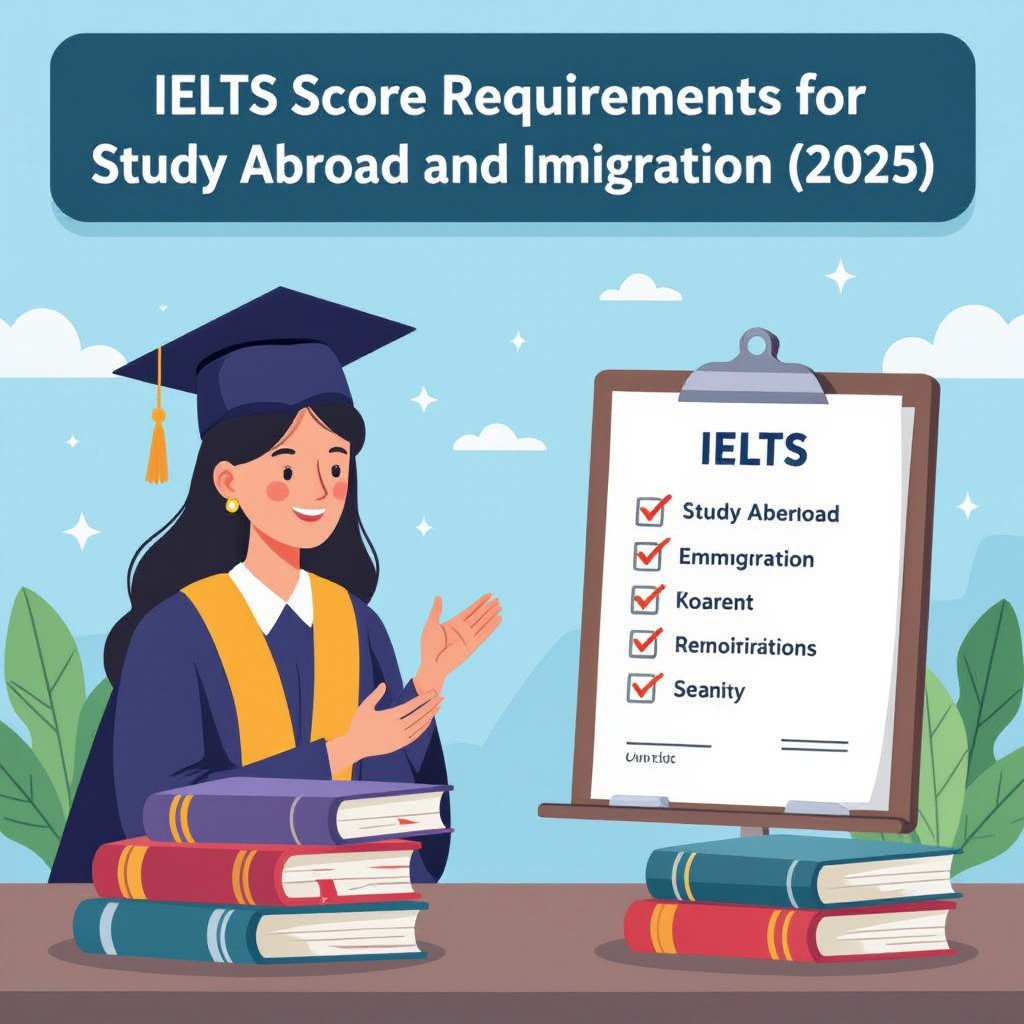In 2025, the IELTS exam stands as a key measure for evaluating English proficiency in major global hubs like the United States, United Kingdom, Canada, Australia, New Zealand, Ireland, and France. It’s essential for both academic admissions and immigration processes. Countries such as Canada and Australia have embraced IELTS scores within their immigration frameworks. This reflects the exam’s broad recognition and the need to meet specific score benchmarks for studying abroad or skilled migration.
Key Takeaways
- IELTS scores remain vital in 2025 for academic and immigration applications in areas including the US, UK, Canada, and Australia.
- Leading universities in the US and UK often set IELTS score requirements between 6.5 and 7.5, with Ivy League schools potentially seeking higher scores.
- Canada and Australia incorporate IELTS scores in their immigration language assessments, with scores around 6.0 to 7.0 commonly expected.
- The IELTS Academic version usually demands higher scores than the General version, particularly for postgraduate studies abroad.
- Recognizing the specific requirements and validity of IELTS scores is crucial for aligning with institutional and immigration standards.
Understanding Global Acceptance of IELTS in 2025
IELTS continues to be recognized widely in 2025, with key destinations such as the United States, United Kingdom, Canada, Australia, New Zealand, Ireland, and France acknowledging its validity. These countries’ top institutions and immigration departments rely on IELTS for gauging English proficiency.
In the United States and the United Kingdom, many universities set specific IELTS score requirements, often between 6.5 and 7.5, depending on the program. Canada and Australia have integrated IELTS into their immigration processes as a marker of language competency, easing entry for study or permanent residency. For expert tips on achieving desired results, check out IELTS Essentials.
Australia and New Zealand similarly trust IELTS for both academic programmes and immigration pathways. In France, several educational institutions, particularly those focused on English-taught programs, list IELTS requirements for enrollment. For more detailed insights regarding IELTS scores for immigration, visit Immigration Help.
Country-Specific IELTS Score Requirements for Academic Programs
Looking at the United States, undergraduates typically need a minimum IELTS score of 6.0. If you’re aiming for Ivy League or top-tier universities, you might need a 7.0 or higher. In the United Kingdom, university courses demand scores from 6.0 to 7.5, while visa requirements start at 4.0.
Consider Australia, where universities generally ask for 6.0 to 7.0. Some offer conditional admission for scores slightly under the mark. In Canada, the baseline is around 6.5 to 7.0, with competitive programs asking for even higher scores. Similarly, universities in New Zealand, Ireland, and France often seek scores from 6.0 to 6.5, but specific requirements may vary.
For more information on IELTS scores for academic purposes, you can visit IELTS.org. Check Study Abroad for details on international education programs.

IELTS Score Requirements for Immigration and Skilled Migration
For those considering immigration or skilled migration, the IELTS General Training test is commonly required, while the Academic version is typically for academic study. Australia demands an overall score of at least 6.0. In contrast, New Zealand’s benchmark is slightly higher at 6.5. Canada’s Permanent Resident (PR) pathways recognize Canadian Language Benchmark (CLB) 7 or an IELTS score between 6.0 and 7.0.
The United Kingdom generally requires a B1 CEFR level for skilled visas. Higher scores can notably boost your eligibility profile. Immigration systems often incorporate IELTS scores into their Comprehensive Ranking System (CRS) or points structures, which can be pivotal for applicants. Always check the specific requirements through reliable sources like the British Council to ensure the most current information.
Keep your scores valid, as they might significantly influence your immigration application success.

Defining a Good IELTS Score for 2025
Scoring a 7.0 to 7.5 or higher on the IELTS is recognized as “very good.” Such scores are frequently needed by leading universities and for certain professional roles. Understanding how these scores align with the CEFR (Common European Framework of Reference) can offer additional clarity. Here’s a quick conversion:
- B1 translates to an IELTS score between 4.0 and 5.0.
- B2 aligns with scores ranging from 5.5 to 6.5.
- C1 corresponds to a score bracket of 7.0 to 8.0.
If you’re targeting prestigious universities, shooting for a higher band, such as C1, is often a wise choice. For a detailed understanding, refer to authoritative resources like the British Council.
Comparison of IELTS Requirements: Education vs. Immigration
When opting for education abroad, the IELTS Academic typically demands higher scores compared to immigration pathways. Universities often ask for scores reflecting an advanced understanding of English, especially for competitive courses. You’re likely to find that most postgraduate programs need a band score of around 6.5 or even 7.0.
For immigration, the IELTS General tends to have lower minimum score requirements. However, it’s crucial to note that specific professional registration or licensing pathways within certain countries like Canada or Australia might still require high band scores, often similar to academic settings.
- Higher Education:
- Undergraduate courses might require a band score of 6.0 or above.
- Postgraduate courses can demand scores ranging from 6.5 to 7.0.
- Immigration:
- General migration often accepts scores as low as 5.0 to 6.0.
- Skilled migration or professional pathways might require similar scores to academic courses.
Exploring official resources like The British Council can give comprehensive details on the differences between “IELTS Academic vs IELTS General.” Understanding this difference equips you to choose the correct test type that aligns with your objectives, whether it’s for studying or immigrating.

Maximizing Your IELTS Score for 2025 Applications
Focusing on the right preparatory strategies can significantly boost your IELTS score. Incorporate mock exams and enlist professional coaching to sharpen your skills. With computer-based tests available almost daily and paper-based tests running up to 48 times annually, you have ample opportunities to choose the format that suits you best.
Don’t forget to check specific requirements with the institutions or immigration authorities you’re applying to. This ensures your efforts align with their expectations.
Considering the validity period of the test is crucial as well. For more detailed guidance, explore expert resources like “IELTS test prep 2025.”
Sources:
Prep Yocket – Countries Accepting IELTS Exam
GyanDhan – Countries Accepting IELTS for Migration
British Council – Minimum IELTS Scores for Different Countries
Shiksha – List of Countries Accepting IELTS Score
Transglobal Overseas – Is 7.5 a Good IELTS Score?
Breffni Academy – IELTS Accepted Countries and Universities in 2025
Maxxcell Overseas – Minimum IELTS Score to Study in USA in 2025
IELTS Material – List of Countries Accepting IELTS Scores
